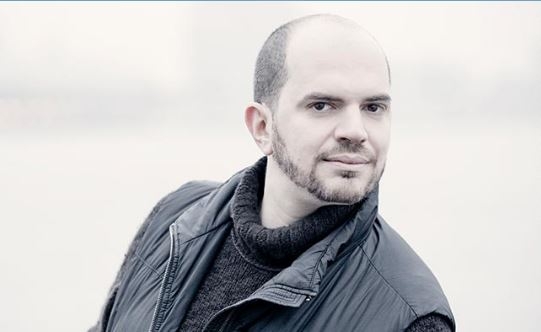Along with a list of staggering credentials (including the 2010 Gilmore Artist Award), Kirill Gerstein has a reputation as an illuminating interpreter. The Jewish-American/Russian pianist made his second appearance at the 2018 Irving S. Gilmore International Keyboard Festival recital on Friday night. Despite the fact that he was battling a cold, Gerstein drew the audience in with his compelling personality and thoughtfulness, and astounding abilities to bring forth each composer’s vision. The program struck a fine balance between intellect and emotion with a diverse range of repertoire.
Gerstein began the concert with “Four Duettos” by J.S. Bach. The pieces are in two-part counterpoint, and Gerstein gave a crystalline rendering of the distinct voices without use of the pedal. Dynamic contrasts were most lustrous in the second and fourth “Duettos,” telling a story of brilliance and brio.
Gerstein then turned to Book I of Claude Debussy’s “Préludes,” twelve vignettes suffused with color and character. His performance dove deep inside the expressive range and movement of the music, from unfettered eddies in “Les Sons et les parfums tournent dans l’air du soir” to cinematic blusters in “Ce qu’a vu le vent d’ouest.” Gerstein’s reading of “La cathédrale engloutie” was a particularly engulfing journey as it vacillated from hypnotic calm to unearthly sonorities and back again.
In the second half of the concert, there was evidence that Gerstein’s stamina was waning. Nevertheless, the pianist gave a satisfying performance of three waltzes by Frédéric Chopin. Gerstein played the closing stretches of “Waltz in A-flat Major, Op. 42” so absurdly fast and light he had more than a few audience members shaking their heads in disbelief.
For Thomas Adès’ “Three Mazurkas,” Gerstein read the music from an iPad setup on the piano, complete with a Bluetooth-connected pedal for turning pages on screen. Written in 2009, these pieces are inspired by the Polish folk dance rhythm Chopin also used to model 59 of his piano works. Gerstein’s take on the first was not entirely convincing as he lost rhythmic momentum toward the middle, and while the second had delightfully turbulent moments, its ending felt unstable and muddled. Gerstein successfully imbued the third with a spectral character.
For the finale, Gerstein swapped out Robert Schumann’s third piano sonata for Johannes Brahms’ second — no doubt because he was feeling under the weather. Save for a few smudged notes, Gerstein exhibited command over the score and with surges of intensity, drama and dignity.
Afterward, Gerstein returned to the stage for two encores. First was an arrangement of a Bach chorale, which Gerstein played devilishly fast. The evening ended with a stormy rendition of “Transcendental Etude No. 8” by Franz Liszt. Even with the lack of energy and focus behind some of the music due to the unfortunate state of his health, Gerstein’s performance left an overall impression of poetry and power.
Kirill Gerstein
Dalton Center
May 4
thegilmore.org





